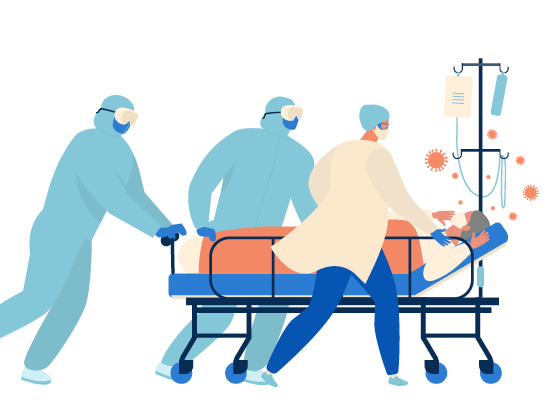
The global COVID-19 pandemic is an unprecedented time in our history. And for our nurses on the frontline, the uncertainty as well as the emotional and physical stress involved, makes this an especially challenging period in their nursing careers. Several Nebraska Medicine nurses tell their stories about why they decided to participate in caring for some of the sickest coronavirus patients in the hospital and how it’s become one of the most rewarding experiences in their lives.
Charles Stewart, RN, BSN, who normally works in the Cardiovascular Intensive Care Unit (ICU), was one of the first to apply for a position to work in the Nebraska Biocontainment Unit when he started hearing about the emergence of COVID-19 in January.
Becoming a part of history
“I was really excited to participate in an illness that was unseen before this time and will become a big part of our history,” says Stewart. “Fifty years from now I will be able to say that I was part of the team of providers that was on the frontline at the bedside using my hands and heart to make a difference.”
Stewart says he has been splitting his time between the COVID-19 unit and the Cardiovascular ICU since March after undergoing COVID-19 training that focused on proper use of personal protective equipment (PPE) and patient care.
Working for a leader in infectious diseases
Knowing that Nebraska Medicine is among the leading medical facilities for the care of people with highly infectious diseases and having one of the few biocontainment units in the country helped reduce Stewart’s fear and anxiety.
“Nebraska Medicine leads the country in treating infectious diseases in many ways,” says Stewart. “We are on the cutting edge of this medical technology. From the beginning, I’ve had a great deal of trust in this organization that they will do everything possible to keep us safe with the proper PPE and safety measures. Any fear and anxiety I had was reduced even more after undergoing training and seeing how prepared we were to deal with this type of highly contagious virus.”
Alexa Johnson, RN, BSN, CCRN, who was working in the Medical Intensive Care Unit when it was transitioned to the COVID-19 ICU, says she was ready and willing to answer the call when the hospital announced it would be changing the unit to caring for COVID-19 patients. “I’ve always been willing to go where nurses are needed,” she says. “I’m always looking for a challenge.”
Like Stewart, Johnson says her fears were diminished after learning about the high level of expertise and preparedness Nebraska Medicine has in this area. “I felt very comfortable after being reassured that we only use the most up-to-date research and evidence-based practices,” she says. “I never felt like I shouldn’t be doing this.”
Nurses are typically assigned two to three patients that they follow each day. During lower census days, they may only care for one patient during a shift.
Enduring the physical and emotional challenges
One of the challenges these nurses have encountered is the tediousness and physical fatigue this type of care requires. “You may be in the same room caring for the same patient in PPE for several hours at a time,” explains Stewart. “So ideally, you want to enter the room with everything you need since you must don fresh PPE each time you leave and enter.”
Sometimes it can feel isolating. “You are in the room by yourself for long periods of time and the patient is often intubated and heavily sedated so you are not getting any feedback from them either,” notes Stewart. “But this will also help you grow tremendously as a clinician. You will be able to work more independently and learn to use more critical thinking skills.”
While these nurses agree that working with COVID-19 patients can be very rewarding, it can also be an emotional roller coaster. “Some patients can be in the unit for up to three to four weeks before seeing any improvement,” notes Johnson. “You may treat a patient for days and days and not see any progress and that can be a little discouraging. But when patients do get better after being so sick for so long, it is extremely rewarding.”
Reaping the personal satisfaction
“The ability to be at a person’s bedside through all of this and then to see them get better and recover – that’s a medical gift we’re able to give our patients,” agrees Stewart.
And when patients don’t recover, “while it’s enormously challenging to guide patients and family when the patient is going to pass away, that’s one of the sacred parts of being a nurse – to be by a patient’s bedside and be a source of comfort as they pass from this world,” Stewart says. “it definitely takes someone with emotional maturity and a good social network outside of work.”
“The deep feeling of satisfaction you get from being able to help patients and their families during this difficult time and knowing you’re really making a difference, makes it all worthwhile,” says Karlee Fuchser, RN, BSN.
Fuchser worked in the Medical Intensive Care Unit for more than three years before it transitioned into the COVID-19 unit. Although she was a little nervous at first, she considered this a huge learning opportunity. “These are the sickest patients I’ve ever seen in the ICU,” explains Fuchser. “But once I went through training and actually started working with them, I got over that initial fear and it wasn’t nearly as scary as I thought it would be.”
Enjoying teamwork and support
Teamwork and support from colleagues have been vital components in maintaining a positive morale and in lifting up colleagues when they are having difficulty. “While the work can be both emotionally and physically draining, there is so much support from everyone around you,” Fuchser says. “You never feel alone. Someone is always there to help you or relieve you if you need it.”
Johnson agrees. “There is a tremendous support system among nurses and providers in the unit. It’s a very nurturing, team-based environment in which everyone is all about helping each other with the goal of getting the patient better.”
Carley Thomas, RN, BSN, who was a trauma nurse for a year before working in the COVID-19 ICU, says this unique situation has left an indelible mark on her. “The camaraderie we have built along the way is unlike anything I’ve ever experienced.”
Gaining clinical and professional growth
She and her fellow nurses also agree that the clinical and professional growth they have encountered is an extremely valuable aspect of working with COVID-19 patients.
“It has been a huge learning opportunity,” notes Thomas. “It’s added more to my knowledge base as a clinician. We are doing things that there has not been precedence for. We are paving the way to learn more about how to treat infectious diseases. I can’t stress enough how great this experience has been and how it can prepare you for bigger things later in your career. You just don’t know where it’s going to take you.”
Thomas says it’s also about being part of a team that is creating the treatment protocols and creative solutions for a virus that is completely new to our population. “Our voices are very important because we are at the bedside,” she says. “It’s like we’re all on a more equal playing field. We’re being heard in those bigger conversations and that’s rewarding. It also helps you feel safe because you know leadership is taking your recommendations seriously.”
“If you’ve thought about serving the community in some way – if this has been on top of your mind—there’s a reason,” says Thomas. “Pull the trigger and do it.”
“Nebraska Medicine is such an amazing hospital and we really need help in caring for these patients,” says Stewart. “If you want to be a part of cutting-edge science, put your best foot forward and be a part of this story.”


